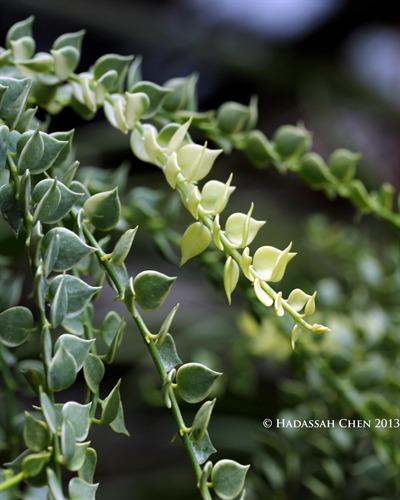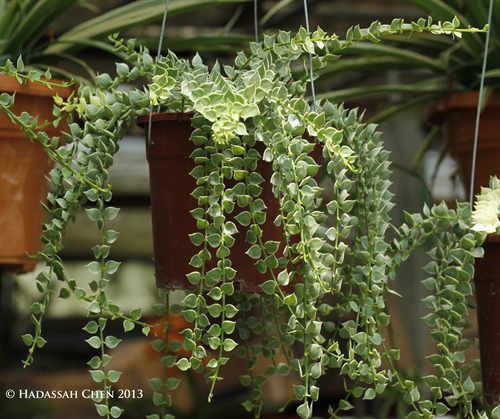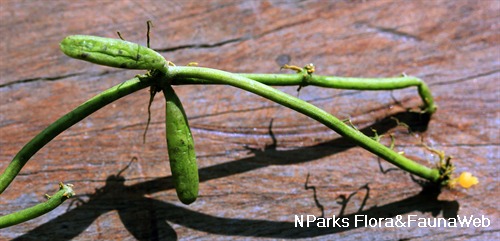_-pauline_tay.jpg)
Back
Dischidia ruscifolia (variegated)
| Family Name: | Apocynaceae |
| Common Name: | Variegated Million Hearts, 百万心 |
Name
Classifications and Characteristics
| Plant Growth Form | Climber, Epiphyte |
|---|---|
| Lifespan (in Singapore) | Perennial |
Biogeography
| Native Distribution | Of horticultural origin |
|---|---|
| Native Habitat | Terrestrial |
| Preferred Climate Zone | Tropical |
Description and Ethnobotany
| Growth Form | Small compact climber with pendent stems |
|---|---|
| Foliage | Leaves cordate, succulent, dull pale green with cream - very pale yellow border, or entirely pale yellow. |
| Flowers | Infloresence axillary, flowers tiny, white or cream |
Landscaping Features
| Desirable Plant Features | Ornamental Foliage, Ornamental Form |
|---|---|
| Landscape Uses | Small Gardens, Skyrise / Balcony, Interiorscape/ Indoor Plant, Container Planting, Suitable for Hanging Baskets |
| Usage Hazard - Cons | Toxic Upon Ingestion |
| Usage Hazard - Cons Remarks | Avoid contact with the sap as it may cause skin irritation in certain individuals. Keep plants away from children and pets as sap could be toxic. |
Fauna, Pollination and Dispersal
| Pollination Method(s) | Biotic (Fauna) |
|---|---|
| Seed or Spore Dispersal | Abiotic |
Plant Care and Propagation
| Light Preference | Semi-Shade |
|---|---|
| Water Preference | Moderate Water |
| Rootzone Tolerance | Well-Drained Soils, Easy to Grow |
| Pest(s) | Sucking Insects |
| Propagation Method | Stem Cutting |
Foliar
| Foliage Retention | Evergreen |
|---|---|
| Mature Foliage Colour(s) | Cream / Off-White, Green - Light Green, Yellow / Golden |
| Mature Foliage Texture(s) | Thick |
Floral (Angiosperm)
| Flower Colour(s) | Cream / Off-White, White |
|---|---|
| Flower Grouping | Solitary |
| Flower Location | Axillary |
| Flowering Period | Free-Flowering |
Image Repository
Others
| Master ID | 31814 |
|---|---|
| Species ID | 6214 |
| Flora Disclaimer | The information in this website has been compiled from reliable sources, such as reference works on medicinal plants. It is not a substitute for medical advice or treatment and NParks does not purport to provide any medical advice. Readers should always consult his/her physician before using or consuming a plant for medicinal purposes. |





.jpg)
